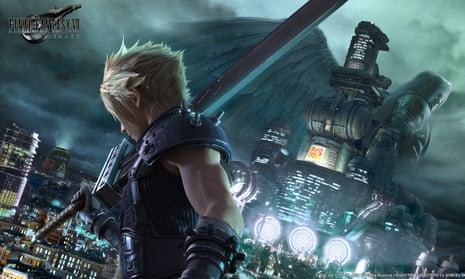In 1997 I called my father to my bedroom. I had been so astonished at an early scene in the recently released Final Fantasy VII, the video game that first demonstrated the cinematic possibilities of the medium as it shifted into three-dimensional art and design, that I had to share my amazement. (He smiled an academic’s smile, then excused himself, probably in much the same way as his father reacted on first encountering the Beach Boys, or Doctor Who.) Final Fantasy VII has subsequently become a sort of Star Wars for many of my generation: a cultural landmark we long to revisit in the hope of experiencing the same sense of childlike wonder and panoramic potential as the first time.
Fully understanding the singular place Final Fantasy VII holds in both hearts and history (this was one of the first video games to be made at blockbuster scale), Tokyo-based maker Square Enix has waited for technology to sufficiently advance before attempting to rebuild the game to contemporary standards. Now, finally, nostalgic players can discover if reality matches memory, while newcomers may judge whether this seminal game warrants all the fuss.
This first instalment in an as-yet undecided number of episodes returns players to the sprawling city of Midgar and the boots of protagonist Cloud Strife, a young mercenary and ex-officer from a private army run by the Shinra Electric Power Company. It seems improbable that a utility provider should have its own militia, but Shinra has a monopoly on Mako, Final Fantasy VII’s equivalent of crude oil, which has made it into a powerful entity – something like a militarised Google. Power has corrupted the company, which now draws the planet’s lifeblood at an unsustainable rate. The game opens on a bombing mission: Cloud has joined a group of eco-terrorists attempting to blow up one of Shinra’s reactors as an act of protest.
The remake has been an obvious passion project for the development team, tasked with extrapolating fine detail from the rudimentary strokes of the original, while transposing the ponderous turn-based battles into an action thriller. But where 1997’s game represented an era-defining technological high point, Japan’s industry now lags behind the west in delivering cinematic pizzazz; in this regard, despite a spirited attempt, Final Fantasy VII Remake falls short of semi-rival series such as Uncharted and The Witcher. Nonetheless, the game fizzes with creativity and memorable set pieces, from sword-fighting in a derelict cathedral, to teetering along scaffolding miles above the city streets, to attempting to break into a crime boss’s brothel in the Wall Market, a striking mishmash of Tokyo’s seedy Kabukichō and Kowloon’s infamous Walled City.
The world is occasionally confused. One of Cloud’s love interests, Aerith Gainsborough, boasts of growing up streetwise in the slums, yet she lives with her mother in an impossibly idyllic countryside cottage a few dozen yards away from the shantytown housing that otherwise dominates the area. This is a creative team often more interested in world-drawing than world-building, the underpinning logic work that makes any fiction feel true; it’s notable that the director of the remake is an artist, not a writer.
At times camp, at times dated, the game is sometimes adolescent and occasionally tedious (stacking shipping containers using crane arms to pick your way through a derelict tunnel is a particularly trying section). And yet that enthralling harmony of character, story and setting, which seeded so much long-held adoration for the game, remains undiminished. In part it’s thanks to the city of Midgar, a rich and unforgettable location. But it’s also because, unlike many other games in the Final Fantasy series, the story is well-plotted, with clear stakes, distinct characters with legible motivations, and even a meaningful allegory for players who, in their millions, will play the game on electronic devices powered by fossil fuels.
Praising a video game for qualities that in any other medium would be considered fundamental might seem condescending. But writing effective stories for video games is a difficult business. As Frank Lantz, director of New York University’s game studies department, once put it: “Games are basically operas made out of bridges.” Final Fantasy VII Remake is both an unfinished construction project and an unfinished opera, then. Its ultimate shape will surely depend on the success of this debut episode, but as a (substantial) taster and a statement of intent, it is a triumph.
Also recommended
The Witcher 3: Wild Hunt
(CD Projekt Red; PS4, Xbox One, PC and Nintendo Switch)

Following the launch of the recent Netflix series based on the The Witcher series of fantasy novels by Polish author Andrzej Sapkowski, sales of this 2015 video game, also inspired by Sapkowski’s novels, increased by more than 500%. No mere cash-in, the game once praised by Barack Obama as “a tribute to the talents and the work ethic of the Polish people” fully captures the wit and imagination of the books. A kind of Grand Theft Auto for medieval huntsmen, it presents a lush world filled with freewheeling adventure and possibility.
